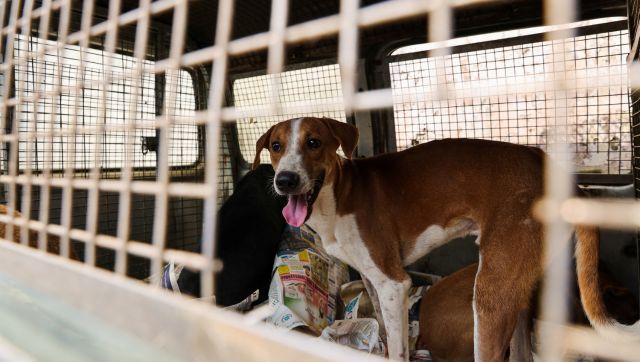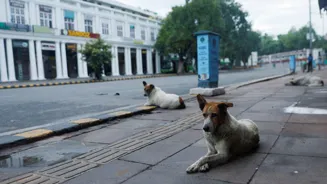What is the story about?
The Supreme Court has taken a stern stance against the "extremely grim" situation of the stray dog menace. On Monday (August 11), the apex court ordered the Delhi government, civic bodies and authorities of Noida, Gurgaon, and Ghaziabad to start picking up the stray canines and shift them to shelters.
It also warned that people or organisations that hamper the process will face strict action. The Supreme Court’s directive comes amid a surge in cases of dog bites and deaths due to rabies.
Let’s take a closer look.
The Supreme Court has directed to pick up all stray dogs in Delhi and the National Capital Region (NCR), emphasising that “immediate steps need to be taken” to address it.
A bench of Justices JB Pardiwala and R Mahadevan said that dog shelters have to be established to accommodate around 5,000 stray dogs and there should be sufficient personnel for sterilisation and immunisation of the canines, as per a
PTI report.
The apex court also ruled against allowing anyone to adopt a stray dog to stop authorities from moving it to the shelter.
It also stated that stray dogs kept at dog shelters will not be released on the streets, colonies and public places. The bench said the centres should have CCTV monitoring so that no dogs are taken out.
The top court told authorities, including the Municipal Corporation of Delhi (MCD) and New Delhi Municipal Corporation (NDMC), to immediately start the work, build the shelters and report the creation of infrastructure within eight weeks, reported
Indian Express.
The authorities have been told to begin picking up stray dogs from all localities, especially vulnerable localities and cities.
"NCT Delhi, MCD, NMDC shall at earlier start picking up stray dogs from all localities, from more particularly vulnerable localities and cities. How to do it is for the authorities to look into and if they have to create a force, do it at the earliest. However, this should be the first and foremost exercise to make all localities free of stray dogs. There should not be any compromise in undertaking any exercise," the court said.
"If any individual or organisation comes in the way of picking stray dogs or rounding them up, we will proceed to take action against any such resistance," it added.

The top court underlined that kids should not get rabies, a deadly virus spread to people from the saliva of infected animals.
“Infants and young children, at any cost, should not fall prey to rabies. The action should inspire confidence that they can move freely without fear of being bitten by stray dogs. No sentiments should be involved.”
The bench also warned against releasing the stray dogs in public places. The order added, "However, what is important, and without which the entire exercise would go futile, not a single stray dog should be released and if we know that this has happened, we will take stern action."
The court also raised concerns about the availability of the rabies vaccines. "The authorities concerned, more particularly the government of NCT Delhi, are directed to put detailed information about the place where such vaccines are available, the stock of vaccines and the number of persons who report for treatment on a monthly basis."
ALSO READ: Kerala wants to ‘euthanise’ sick stray dogs. How grave is India’s canine problem?
The Supreme Court has ordered the setting up of a helpline within a week to report dog bites and rabies. It said that authorities should act within four hours to pick up a dog after receiving a complaint, and any person or organisation obstructing the action will face strict action.
The top court also asked Delhi-NCR authorities to submit a status report on the implementation of its orders when the matter is heard after six weeks.
Authorities will have to maintain a daily record of all stray dogs captured. The court said that civic authorities can take a call on how to carry out this task, including even forming a dedicated force if needed.
The apex court’s orders come after it took suo motu cognisance of a media report on the stray dog menace in Delhi last month.
A six-year-old girl in Delhi died of rabies after she was bitten by a stray dog in July. A four-year-old boy was also mauled by a pack of strays.
As per official data from the Municipal Corporation of Delhi, 49 rabies cases were reported in the city between January and June this year, PTI reported. The national capital also saw 35,198 animal bite incidents during this period.
Dog bite cases in Delhi increased from 6,691 in 2022 to 17,874 in 2023 and further to 25,210 in 2024, according to data from the Integrated Disease Surveillance Programme (IDSP). This is an overall surge of almost 277 per cent in just two years.
As many as 3,196 cases were reported in January alone this year.
Rabies claims nearly 60,000 lives globally every year. India accounts for 36 per cent of global rabies deaths and 65 per cent of the fatalities in South Asia, as per the World Health Organisation (WHO) data.
Delhi recently formed a special committee under the Municipal Corporation of Delhi to begin targeted sterilisation and immunisation campaigns in 12 assembly constituencies.
It plans to achieve 70 to 80 per cent sterilisation in each area, taking it to 100 per cent coverage city-wide, eventually. Twenty new shelters will also be built.
With inputs from agencies
It also warned that people or organisations that hamper the process will face strict action. The Supreme Court’s directive comes amid a surge in cases of dog bites and deaths due to rabies.
Let’s take a closer look.
What Supreme Court said
The Supreme Court has directed to pick up all stray dogs in Delhi and the National Capital Region (NCR), emphasising that “immediate steps need to be taken” to address it.
A bench of Justices JB Pardiwala and R Mahadevan said that dog shelters have to be established to accommodate around 5,000 stray dogs and there should be sufficient personnel for sterilisation and immunisation of the canines, as per a
The apex court also ruled against allowing anyone to adopt a stray dog to stop authorities from moving it to the shelter.
It also stated that stray dogs kept at dog shelters will not be released on the streets, colonies and public places. The bench said the centres should have CCTV monitoring so that no dogs are taken out.
The top court told authorities, including the Municipal Corporation of Delhi (MCD) and New Delhi Municipal Corporation (NDMC), to immediately start the work, build the shelters and report the creation of infrastructure within eight weeks, reported
The authorities have been told to begin picking up stray dogs from all localities, especially vulnerable localities and cities.
"NCT Delhi, MCD, NMDC shall at earlier start picking up stray dogs from all localities, from more particularly vulnerable localities and cities. How to do it is for the authorities to look into and if they have to create a force, do it at the earliest. However, this should be the first and foremost exercise to make all localities free of stray dogs. There should not be any compromise in undertaking any exercise," the court said.
"If any individual or organisation comes in the way of picking stray dogs or rounding them up, we will proceed to take action against any such resistance," it added.

A stray dog is seen in the back of an animal ambulance after it was captured by Municipal Corporation of Delhi (MCD) officials near Indira Gandhi International Airport ahead of the G20 summit in New Delhi, September 5, 2023. File Photo/Reuters
The top court underlined that kids should not get rabies, a deadly virus spread to people from the saliva of infected animals.
“Infants and young children, at any cost, should not fall prey to rabies. The action should inspire confidence that they can move freely without fear of being bitten by stray dogs. No sentiments should be involved.”
The bench also warned against releasing the stray dogs in public places. The order added, "However, what is important, and without which the entire exercise would go futile, not a single stray dog should be released and if we know that this has happened, we will take stern action."
The court also raised concerns about the availability of the rabies vaccines. "The authorities concerned, more particularly the government of NCT Delhi, are directed to put detailed information about the place where such vaccines are available, the stock of vaccines and the number of persons who report for treatment on a monthly basis."
ALSO READ: Kerala wants to ‘euthanise’ sick stray dogs. How grave is India’s canine problem?
Hotline to be set up
The Supreme Court has ordered the setting up of a helpline within a week to report dog bites and rabies. It said that authorities should act within four hours to pick up a dog after receiving a complaint, and any person or organisation obstructing the action will face strict action.
The top court also asked Delhi-NCR authorities to submit a status report on the implementation of its orders when the matter is heard after six weeks.
Authorities will have to maintain a daily record of all stray dogs captured. The court said that civic authorities can take a call on how to carry out this task, including even forming a dedicated force if needed.
Delhi’s stray dog menace
The apex court’s orders come after it took suo motu cognisance of a media report on the stray dog menace in Delhi last month.
A six-year-old girl in Delhi died of rabies after she was bitten by a stray dog in July. A four-year-old boy was also mauled by a pack of strays.
As per official data from the Municipal Corporation of Delhi, 49 rabies cases were reported in the city between January and June this year, PTI reported. The national capital also saw 35,198 animal bite incidents during this period.
Dog bite cases in Delhi increased from 6,691 in 2022 to 17,874 in 2023 and further to 25,210 in 2024, according to data from the Integrated Disease Surveillance Programme (IDSP). This is an overall surge of almost 277 per cent in just two years.
As many as 3,196 cases were reported in January alone this year.
Rabies claims nearly 60,000 lives globally every year. India accounts for 36 per cent of global rabies deaths and 65 per cent of the fatalities in South Asia, as per the World Health Organisation (WHO) data.
Has Delhi done anything to curb the menace?
Delhi recently formed a special committee under the Municipal Corporation of Delhi to begin targeted sterilisation and immunisation campaigns in 12 assembly constituencies.
It plans to achieve 70 to 80 per cent sterilisation in each area, taking it to 100 per cent coverage city-wide, eventually. Twenty new shelters will also be built.
With inputs from agencies




















